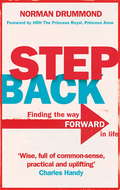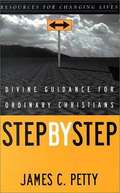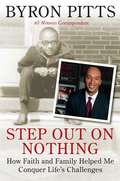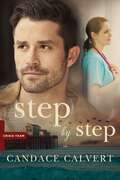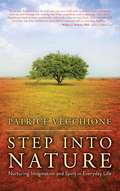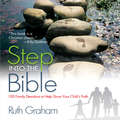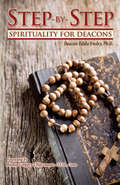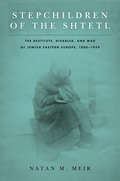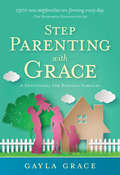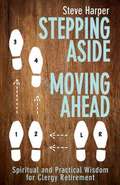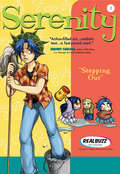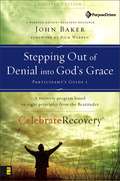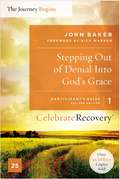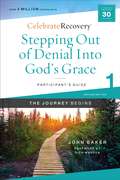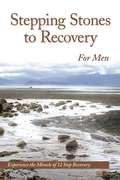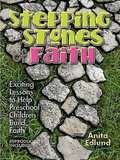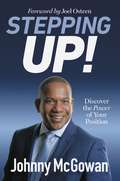- Table View
- List View
Stempenyu: A Jewish Romance (The Art of the Novella)
by Sholem Aleichem Hannah BermanEven the most pious Jew need not shed so many tears over the destruction of Jerusalem as the women were in the habit of shedding when Stempenyu was playing.The first work of Sholom Aleichem's to be translated into English--this long out-of-print translation is the only one ever done under Aleichem's personal supervision--Stempenyu is a prime example of the author' s hallmark traits: his antic and often sardonic sense of humor, his whip-smart dialogue, his workaday mysticism, and his historic documentation of shtetl life. Held recently by scholars to be the story that inspired Marc Chagall's "Fiddler on the Roof" painting (which in turn inspired the play that was subsequently based on Aleichem's Tevye stories, not this novella), Stempenyu is the hysterical story of a young village girl who falls for a wildly popular klezmer fiddler--a character based upon an actual Yiddish musician whose fame set off a kind of pop hysteria in the shtetl. Thus the story, in this contemporaneous "authorized" translation, is a wonderful introduction to Aleichem's work as he wanted it read, not to mention to the unique palaver of a nineteenth-century Yiddish rock star.
Step Back: Why you need to stop what you're doing to really start living
by Norman DrummondModern life is frantically busy - we rush from one thing to another, never stopping to think about what really matters to us, what we could be achieving if we could only slow down for long enough to see it. Norman Drummond draws on his wide experience as a headteacher, as a minister and as an internationally respected coach in life and business to bring home the fundamental lesson he has learned both for himselfand for others: we can't hope to achieve our potential unless we take time out to work out what is most important to us. Whether for a few minutes or for a few days, alone or with others - Drummond shows how easy and how effective stepping back can be. Most importantly, he focuses on the rich rewards of stepping back: clarity of thought, stronger objectives - and the ability to discern the true priorities of your own heart. STEP BACK is an essential book for a culture that is unable to rest and relax
Step Back: Why you need to stop what you're doing to really start living
by Norman DrummondModern life is frantically busy - we rush from one thing to another, never stopping to think about what really matters to us, what we could be achieving if we could only slow down for long enough to see it.Norman Drummond draws on his wide experience as a headteacher, as a minister and as an internationally respected coach in life and business to bring home the fundamental lesson he has learned both for himselfand for others: we can't hope to achieve our potential unless we take time out to work out what is most important to us.Whether for a few minutes or for a few days, alone or with others - Drummond shows how easy and how effective stepping back can be.Most importantly, he focuses on the rich rewards of stepping back: clarity of thought, stronger objectives - and the ability to discern the true priorities of your own heart.STEP BACK is an essential book for a culture that is unable to rest and relax
Step By Step
by James C. Petty"Step by Step is a fresh, up-to-date, biblical, edifying, and well-written approach to the old but important Christian question: How can I know the will of God for my life? ... I commend this wise and balanced book to everyone." James M. Boice
Step Out on Nothing: How Faith and Family Helped Me Conquer Life's Challenges
by Byron PittsIt was August 25, 2006, my first on-camera studio open for the CBS News broadcast 60 Minutes. Executive Producer Jeff Fager poked his head in the dressing room. "Good luck, Brotha! You've come a long way to get here. You've earned it." If only he knew. My mind flashed back to elementary school, when a therapist had informed my mother, "I'm sorry, Mrs. Pitts, your son cannot read. " In Step Out on Nothing, Byron Pitts chronicles his astonishing story of overcoming a childhood filled with obstacles to achieve enormous success in life. Throughout Byron's difficult youth - his parents separated when he was twelve and his mother worked two jobs to make ends meet - he suffered from a debilitating stutter. But Byron was keeping an even more embarrassing secret: He was also functionally illiterate. For a kid from inner-city Baltimore, it was a recipe for failure. Pitts turned struggle into strength and overcame both of his impediments. Along the way, a few key people "stepped out on nothing" to make a difference for him - from his mother, who worked tirelessly to raise her kids right and delivered ample amounts of tough love, to his college roommate, who helped Byron practice his vocabulary and speech. Pitts even learns from those who didn't believe in him, like the college professor who labeled him a failure and told him to drop out of college. Through it all, he persevered, following his steadfast passion. After fifteen years in local television, he landed a job as a correspondent for CBS News in 1998, and went on to become an Emmy Award - winning journalist and a contributing correspondent for 60 Minutes. Not bad for a kid who couldn't read. From a challenged youth to a reporting career that has covered 9/11 and Iraq, Pitts's triumphant and uplifting story will resonate with anyone who has felt like giving up in the face of seemingly insurmountable hardships.
Step To This: A So For Real Novel
by Nikki CarterFifteen-year-old Gia Stokes knows exactly what she needs to make her life fantabulous: Get her mother Gwendolyn to let her relax her hair Find a boy to ask her out Get on the Hi-Steppers dance squad Gia doesn't have the hair or the clothes, but she's got the moves and the attitude to make her sophomore year at Longfellow High unforgettable. But not everyone agrees, so Gia decides it's time for a makeover. With her stylish new look, she scores a date with hottie football player, Romeo, snags a spot on the Hi-Steppers dance squad, and makes a ton of new friends. Gia's on top of the world'until things go horribly wrong. Now Gia feels like all she has left is her mom and her faith. That's not going to stop Gia, she's just got to convince the Hi-Steppers and everyone else at school, to follow her lead and step to her beat. Step to This is hot, it's new, it's now. . . with characters that leap from the pages, it's absolutely a must-read. --Monica McKayhan, Essence bestselling author of Indigo Summer Filled with smart and witty characters, Step to This is a fun, fast-paced read teens will love. --Ni-Ni Simone, author of A Girl Like Me Nikki Carter steps up and delivers a home run with her debut novel, Step to This. It's a real winner. --Chandra Sparks Taylor, author of Spin It Like That and The Pledge Nikki Carter is a fresh, new voice in teen fiction! Step to This has it all--drama, humor, and a lesson that everyone can learn from. Full of fun-loving, unforgettable characters that readers will love, Nikki has written a page-turner that will leave the reader wanting more! --ReShonda Tate Billingsley, author of The Good Girlz series Gia Stokes might be a Hi-Stepper, but this teen role model has both feet on the ground as she meets life's challenges with style and grace. Kudos to Nikki Carter for a great start in this fun and relevant teen series! --Melody Carlson, author of The Carter House Girls, Diary of a Teenage Girl, TrueColors and The Secret Life of Samantha McGregor series Step to This is a wonderful, witty tale that is full of laugh-out-loud moments and great lessons. --Victoria Christopher Murray, National bestselling author of The Divine Divas series Fun, honest, and so for real . . . I loved Gia and cheered for her as she struggled to find where she fits with friends, family, and faith. Debut author Nikki Carter is now on my must-read list! --Shelley Adina, author of the All About Us series Step to This has alluring characters, wonderful scenes, and a fascinating premise. Nikki Carter has a real talent for writing stories that deal with real issues, but are gripping to read by teens and adults alike. --Jacquelin Thomas, author of The Divine Series
Step Up: Becoming the Leader God Made You to Be
by Denise VaneckHow do you define leadership? What kind of leader are you? What kind of leader can you be? Can you be both a leader and a follower? You can get a handle on these and other crucial questions by wrapping your brain around Leadership 101. It focuses on the nuts and bolts of solid Christian leadership (prayer, service, communication, conflict management, mentoring, etc.) but also goes deep into the soul of leadership. In these pages you’ll find out why leading isn’t always what we expect—and how leaders aren’t always who we expect them to be. You’ll learn to integrate your heart with the skills of leadership. And you’ll discover how Jesus, David, and others journeyed on the leadership path—so you can join them, too. This interactive guide also includes checklists, surveys, fill-in-the-blank questions, and journal exercises so you can take your own leadership pulse, identify the traits you want to live out, and record your thoughts and prayers right on the pages—which helps you put leadership into practice more quickly and effectively. Just remember: Leadership isn’t a job…it’s a journey.
Step by Step (Crisis Team Ser. #2)
by Candace CalvertThree years after a tragic accident left her a widow nurse Taylor Cabot is determined to move on, checking off one item on her Survival List after another. Her relationship with a handsome plastic surgeon even gives her hope for the last point--" fall in love again." At least until crisis chaplain Seth Donovan steps back into her life, reawakening unanswered questions about her husband's death. While in San Diego to train community volunteers, Seth hopes to learn,why Taylor is backing away from the crisis team and from their friendship. But nothing prepares him for the feelings that arise when he sees Taylor again... and sees her moving on with another man. When a community crisis hits home and puts lives at risk, emotions run high and buried truths are unearthed. Will hope make the Survival List? CANDACE CALVERT is a former ER nurse and author of the Mercy Hospital, Grace Medical, and Crisis Team series. Her ilk ‘ ,medical dramas offer readers a chance to "scrub in" on the exciting world of emergency medicine. Wife, mother, and very proud grandmother, Candace makes her home in northern California. Please visit her website at www.candacecalvert.com
Step into Nature: Nurturing Imagination and Spirit in Everyday Life
by Patrice VecchioneStep outside your door and reconnect with nature. From the author of Writing and the Spiritual Life comes a guide that will replenish your connection to the earth and inspire you to develop and strengthen your imagination.The natural world has inspired artists, seekers, and thinkers for millennia, but in recent times, as the pace of life has sped up, its demands have moved us indoors. Yet nature's capacity to lead us to important truths, to invigorate and restore our imagination and equilibrium, is infinite. Step into Nature makes nature personal again by stimulating awareness and increasing our understanding of the environment. But being in nature doesn't mean flying off to remote, faraway places. Nature is as close as opening your front door--and opening your heart to the sky above, the miniature gardens that push their way up between the sidewalk cracks in our cities, and the small stream just down the road. Patrice Vecchione demonstrates how nature can support and enhance your creative output, invigorate your curiosity, and restore your sense of connection to and love of the earth. Included throughout the book is "The Cabinet of Curiosities," exercises and suggestions for practical and unexpected ways to stimulate your imagination, deepen your relationship with nature, and experience the harmony between creativity and the natural world.
Step into the Bible: 100 Bible Stories for Family Devotions
by Ruth GrahamIn just 10 minutes, your family can take a step into the Bible. Fresh, creative and engaging — this devotional helps you explore the Bible together. Designed for use with kids ages 10 and under, Step Into the Bible includes the following features:100 Bible stories highlight the core values of the Christian faith; Unique layout with rich, full-color photography; Open ended questions encourage exploration and spark imagination; Memory verses build spiritual character and knowledge. “This book is a children’s Christian classic. I am happy to recommend it to all parents, and urge them to take advantage of its unique approach. I know of no book on the market like it.” – Billy Graham. Ruth Graham shares this collection of Bible stories that has been used by four generations of the Graham family. Winner of the 2008 Christian Book Award.
Step into the Bible: 100 Family Devotions to Help Grow Your Child’s Faith
by Ruth GrahamIn just 10 minutes, your family can take a step into the Bible. Fresh, creative, and engaging, this devotional helps you explore the Bible together. Designed for use with kids ages eight and under, Step into the Bible includes the following features: 100 Bible stories highlight the core values of the Christian faith, a unique layout with rich, full-color photography, open-ended questions that encourage exploration and spark imagination, and memory verses that build spiritual character and knowledge. “This book is a children’s Christian classic. I am happy to recommend it to all parents, and urge them to take advantage of its unique approach. I know of no book on the market like it.” – Billy Graham. Ruth Graham shares this collection of Bible stories that has been used by four generations of the Graham family. Winner of the 2008 Christian Book Award.
Step-by-Step Spirituality for Deacons
by PhD Eddie EnsleyIn this book, Deacon Eddie Ensley explores ways that permanent deacons can enrich their prayer and ministry through “lectio divina,” a renewed appreciation for the “Liturgy of the Hours,” and entering into a fuller sense of “diakonia.” The stories and insights in this book are truly tools for faith enrichment and “becoming one with God” in prayer and ministry.
Stepchildren of the Shtetl: The Destitute, Disabled, and Mad of Jewish Eastern Europe, 1800-1939 (Stanford Studies in Jewish History and Culture)
by Natan M. MeirMemoirs of Jewish life in the east European shtetl often recall the hekdesh (town poorhouse) and its residents: beggars, madmen and madwomen, disabled people, and poor orphans. Stepchildren of the Shtetl tells the story of these marginalized figures from the dawn of modernity to the eve of the Holocaust. Combining archival research with analysis of literary, cultural, and religious texts, Natan M. Meir recovers the lived experience of Jewish society's outcasts and reveals the central role that they came to play in the drama of modernization. Those on the margins were often made to bear the burden of the nation as a whole, whether as scapegoats in moments of crisis or as symbols of degeneration, ripe for transformation by reformers, philanthropists, and nationalists. Shining a light into the darkest corners of Jewish society in eastern Europe—from the often squalid poorhouse of the shtetl to the slums and insane asylums of Warsaw and Odessa, from the conscription of poor orphans during the reign of Nicholas I to the cholera wedding, a magical ritual in which an epidemic was halted by marrying outcasts to each other in the town cemetery—Stepchildren of the Shtetl reconsiders the place of the lowliest members of an already stigmatized minority.
Stephen Stands Strong
by Julie StiegemeyerAn easy-to-read rendering of Acts 7. Other Arch books are available in this library.
Stepparenting with Grace: Encouragement for Blended Families
by Gayla GraceThese devotions provide companionship, encouragement, understanding, and biblical insights from a veteran stepmom. This trusted resource will help you gain strength, wisdom, and comfort as you navigate the rocky terrain of creating a blended family. You will learn how to:Trust a loving God when the kids do not.Find unity in your new marriage and parenting through grace and understanding.Explore your worth in Christ amid rejection.Gain confidence in the stepparent role as you take on the armor of God.Persevere through challenges and obstacles toward healthy, thriving relationships.Each devotion begins with Scripture along with an encouraging thought for the day and closes with prayer.
Stepping Aside, Moving Ahead: Spiritual and Practical Wisdom for Clergy Retirement
by Steve HarperFor clergy, retirement is an opportunity—and a matter of the soul.The topic of retirement is critical for an increasing number of clergy, but it is often ignored—something many clergy would rather not think about. After decades of leadership, retirement can seem more like an obstacle—or even like oblivion—than an opportunity. Stepping Aside, Moving Ahead offers guidance for any clergyperson within a decade of retirement. Author Steve Harper writes in the form of letters to a fictitious "every-pastor." Through these compassionate and instructive letters, the author dialogues with clergy who are just beginning to think about what retirement might bring and with those who stand on the brink of it. He guides the reader through the entire process of planning for retirement: from the initial questions about timing, to financial and other practical concerns, to issues of call and legacy, and more. Steve Harper’s wise counsel and pastoral voice is just what clergy need."Retirement is a spiritual question for pastors. Having answered the call of God to lifetime ministry, how does a pastor assume the role of a retiree? Steve Harper answers the question with spiritual insights and practical suggestions that affirm retirement as a chapter in God’s call leading us to new depths of understanding in renewal and new heights of joy in redeployment." —David McKenna, President Emeritus, Asbury Theological Seminary, Wilmore, KY"Stepping Aside, Moving Ahead offers theological, personal, and practical advice for anyone who is considering or who is already in retirement. Harper includes a comprehensive spectrum of the issues around clergy retirement. His message is clear: there is abundant life after retirement. This book should be given to every clergy at preretirement seminars in order to prepare servant leaders for this fruitful chapter in their lives." —Peggy A. Johnson, Bishop, Philadelphia Area, UMC"This book is an excellent tool for boomers and clergy ... who see greatsignificance in living our legacy of love and faith as we mentorothers!" --Clayton L. Smith, Executive Pastor, United Methodist Churchof the Resurrection
Stepping Heavenward: One Woman's Journey to Godliness (Inspirational Library Series)
by Elizabeth PrentissThis charming journal of a nineteenth century girl takes us from her sixteenth birthday ("How dreadfully old I am getting!") to her last entries when she was ill and in her forties, aware that she had very little time left. It is a story of the shaping of a soul-of her learning day by day, in the seemingly insignificant little events of an ordinary life, that deep happiness is found, not in seeking fulfillment for oneself, but in a glad and free self-offering for the sake of others. We follow her maturing to womanhood, we learn of her narrow escape from commitment to the wrong man, and of her engagement and marriage to the right one. But there was not as much "honey" on the honeymoon as her dreams had predicted. She had had no practice in giving up her own preferences in a day-to-day relationship with a man. She says to herself, at one point in her journal, "I would like to know if there is any reason on earth why a woman should learn self-forgetfulness which does not also apply to a man?" When little Ernest is born she finds he has a passionate temper and a good deal of self-will, along with fine qualities. "I wish he had a better mother. I am so impatient with him when he is wayward and perverse! ... Next to being a perfect wife I want to be a perfect mother. How mortifying, how dreadful in all things to come short of one's standards!" Having in-laws living with the family is another opportunity to "step heavenward," receiving grace to help as grace is continually needed. This book is a treasure of godly and womanly wisdom, told with disarming candor and humility, yet revealing a deep heart's desire to know God. We need such intimate accounts, need them desperately when the word commitment is so little understood and so seldom practiced.
Stepping Out
by Realbuzz StudiosIt's deep dish trouble for Serenity. Detention, date-stealing, and an out-of-control driving mishap. It all adds up to some unexpected twists and turns in Serenity's life--leading her to a job delivering pizzas and a desperate plea for deliverance that only God can answer.
Stepping Out of Denial into God's Grace Participant's Guide 1
by John BakerAlcoholism - Divorce - Sexual Abuse - Codependency - Domestic Violence - Drug Addition - Sexual Addiction These words are about more than "issues." They're about people who sit as close to us as the next pew -- or our own. People struggling with problems that sermons or Bible studies alone won't solve. But there is a way the church can help the hurting move beyond their wounds to experience the healing and liberty of Christ. Celebrate Recovery fills a long-standing need in the church in its role as Christ's healing agent. Developed by John Baker and Rick Warren of the renowned Saddleback Church, this program's life-changing effectiveness has gained it an explosive, grass-roots popularity. Drawn from the Beatitudes, Celebrate Recovery helps people resolve painful problems in the context of the church as a whole. Rather than setting up an isolated recovery community, it helps participants and their churches come together and discover new levels of care, acceptance, trust, and grace. Whether your congregation is large or small, this 25-session fellowship-based curriculum truly will be a celebration of Christ in the life of your church and its members. Everything you need is here: • One 20-minute DVD introductory guide for leaders • One leader's guide • Four 4-volume participant’s guides • CD-ROM with 25 lessons - Road to Recovery series • CD-ROM with sermon transcripts and reproducible promotional materials • 4-volume audio CD sermon series • All in a proven, groundbreaking program, painstakingly and prayerfully developed to help people discover new dignity, strength, joy, and growth in the image of Christ.
Stepping Out of Denial into God's Grace Participant's Guide 1: A Recovery Program Based on Eight Principles from the Beatitudes
by John BakerThe Celebrate Recovery Participant’s Guides are essential tools for the personal recovery journey. In the six lessons in Guide 1: Stepping Out of Denial Into God's Grace, you will experience the first 3 of the 8 recovery principles: 1 Realize I'm not God. I admit that I am powerless to control my tendency to do the wrong thing and that my life is unmanageable. "Happy are those who know they are spiritually poor" (Matthew 5:3). 2 Earnestly believe that God exists, that I matter to him, and that he has the power to help me recover. "Happy are those who mourn, for they shall be comforted" (Matthew 5:4). 3 Conciously choose to commit all my life and will to Christ's care and control. "Happy are the meek" (Matthew 5:5). By working through the lessons and exercises found in each of the four Participant’s Guides you will begin to experience the true peace and serenity you have been seeking, restore and develop stronger relationships with others and with God, and find freedom from life's hurts, hang-ups, and habits. All the scriptures have been updated to the new NIV 2011 version.
Stepping Out of Denial into God's Grace Participant's Guide 1: A Recovery Program Based on Eight Principles from the Beatitudes (Celebrate Recovery)
by John BakerThe Celebrate Recovery Participant's Guides are essential tools for the personal recovery journey. In the six lessons in Guide 1: Stepping Out of Denial Into God's Grace, you will experience the first 3 of the 8 recovery principles:1 Realize I'm not God. I admit that I am powerless to control my tendency to do the wrong thing and that my life is unmanageable. "Happy are those who know they are spiritually poor" (Matthew 5:3).2 Earnestly believe that God exists, that I matter to him, and that he has the power to help me recover. "Happy are those who mourn, for they shall be comforted" (Matthew 5:4).3 Consciously choose to commit all my life and will to Christ's care and control. "Happy are the meek" (Matthew 5:5).By working through the lessons and exercises found in each of the four Participant's Guides you will begin to experience the true peace and serenity you have been seeking, restore and develop stronger relationships with others and with God, and find freedom from life's hurts, hang-ups, and habits. All the scriptures have been updated to the new NIV 2011 version.
Stepping Out of Self-Deception: The Buddha's Liberating Teaching of No-Self
by Joseph Goldstein Rodney SmithAnatta is the Buddhist teaching on the nonexistence of a permanent, independent self. It's a notoriously puzzling and elusive concept, usually leading to such questions as, "If I don't have a self, who's reading this sentence?" It's not that there's no self there, says Rodney Smith. It's just that the self that is reading this sentence is a configuration of elements that at one time did not exist and which at some point in the future will disperse. Even in its present existence, it's more a temporary arrangement of components rather than something solid. Anatta is a truth the Buddha considered to be absolutely essential to his teaching. Smith shows that understanding this truth can change the way you relate to the world, and that the perspective of selflessness is critically important for anyone involved in spiritual practice. Seeing it can be the key to getting past the idea that spirituality has something to do with self-improvement, and to accessing the joy of deep insight into reality.
Stepping Stones To Recovery For Men: Experience The Miracle Of 12 Step Recovery
by AnonymousThis male perspective on the Twelve Step program offers insight into the unique needs of men through articles, reflections, and affirmations.This male perspective on the Twelve Step program offers insight into the unique needs of men through articles, reflections, and affirmations. It presents workable examples and ideas for positive personal and spiritual growth.
Stepping Stones of Faith: Exciting Lessons to Help Preschool Children Build Faith
by Anita EdlundThis Collection of preschool lessons examines twelve stepping stones of faith for preschoolers and develops them into complete lessons, including a Bible story for each stepping stone, activities, snacks, and music.
Stepping Up!: Discover the Power of Your Position
by Joel Osteen Johnny McGowanUnlock God's power to elevate your position and reach your full potential with Stepping Up! by Lakewood Church pastor Johnny McGowan.No matter your current position, God will unlock the power for you to reach your incredible potential. The key is to approach all you do with a servant's heart versus your own ambition. This guide to serving with passion, integrity, and intuition for success explores how to appreciate today while anticipating the possibilities that await tomorrow.With biblical wisdom and personal insights, Johnny McGowan reveals his own exciting trajectory and the doors that were opened each time he stepped up to serve God. For the past thirty years, he has devoted his gifts to serving Lakewood, one of America's largest churches. Along the way, he has marveled at the leadership opportunities God presented as he stayed committed to serving something larger than himself. By seeking only to fulfill God's will for his life, Johnny has been blessed with increasing responsibility and innumerable ways to make a difference through Stepping Up! Regardless of where you are, God can take you where you want to go-and beyond! Chasing the "number one" role or promotion by your own hands will never be fulfilling. God has even bigger things in store for you, and your future starts now. Learn to listen to God's call and let Him direct your actions. As you do, you'll rise by discovering the true power of your position.

